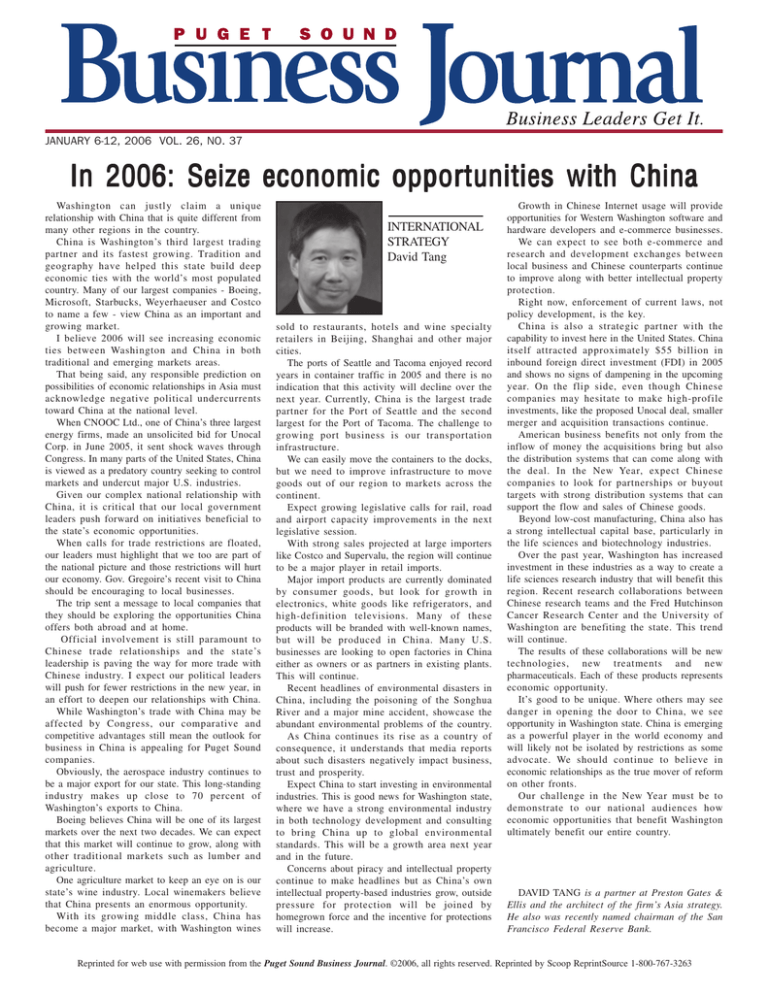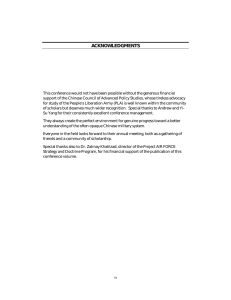
JANUARY 6-12, 2006 VOL. 26, NO. 37
In 2006: Seize economic opportunities with China
Washington can justly claim a unique
relationship with China that is quite different from
many other regions in the country.
China is Washington’s third largest trading
partner and its fastest growing. Tradition and
geography have helped this state build deep
economic ties with the world’s most populated
country. Many of our largest companies - Boeing,
Microsoft, Starbucks, Weyerhaeuser and Costco
to name a few - view China as an important and
growing market.
I believe 2006 will see increasing economic
ties between Washington and China in both
traditional and emerging markets areas.
That being said, any responsible prediction on
possibilities of economic relationships in Asia must
acknowledge negative political undercurrents
toward China at the national level.
When CNOOC Ltd., one of China’s three largest
energy firms, made an unsolicited bid for Unocal
Corp. in June 2005, it sent shock waves through
Congress. In many parts of the United States, China
is viewed as a predatory country seeking to control
markets and undercut major U.S. industries.
Given our complex national relationship with
China, it is critical that our local government
leaders push forward on initiatives beneficial to
the state’s economic opportunities.
When calls for trade restrictions are floated,
our leaders must highlight that we too are part of
the national picture and those restrictions will hurt
our economy. Gov. Gregoire’s recent visit to China
should be encouraging to local businesses.
The trip sent a message to local companies that
they should be exploring the opportunities China
offers both abroad and at home.
Official involvement is still paramount to
Chinese trade relationships and the state’s
leadership is paving the way for more trade with
Chinese industry. I expect our political leaders
will push for fewer restrictions in the new year, in
an effort to deepen our relationships with China.
While Washington’s trade with China may be
affected by Congress, our comparative and
competitive advantages still mean the outlook for
business in China is appealing for Puget Sound
companies.
Obviously, the aerospace industry continues to
be a major export for our state. This long-standing
industry makes up close to 70 percent of
Washington’s exports to China.
Boeing believes China will be one of its largest
markets over the next two decades. We can expect
that this market will continue to grow, along with
other traditional markets such as lumber and
agriculture.
One agriculture market to keep an eye on is our
state’s wine industry. Local winemakers believe
that China presents an enormous opportunity.
With its growing middle class, China has
become a major market, with Washington wines
INTERNATIONAL
STRATEGY
David Tang
sold to restaurants, hotels and wine specialty
retailers in Beijing, Shanghai and other major
cities.
The ports of Seattle and Tacoma enjoyed record
years in container traffic in 2005 and there is no
indication that this activity will decline over the
next year. Currently, China is the largest trade
partner for the Port of Seattle and the second
largest for the Port of Tacoma. The challenge to
growing port business is our transportation
infrastructure.
We can easily move the containers to the docks,
but we need to improve infrastructure to move
goods out of our region to markets across the
continent.
Expect growing legislative calls for rail, road
and airport capacity improvements in the next
legislative session.
With strong sales projected at large importers
like Costco and Supervalu, the region will continue
to be a major player in retail imports.
Major import products are currently dominated
by consumer goods, but look for growth in
electronics, white goods like refrigerators, and
high-definition televisions. Many of these
products will be branded with well-known names,
but will be produced in China. Many U.S.
businesses are looking to open factories in China
either as owners or as partners in existing plants.
This will continue.
Recent headlines of environmental disasters in
China, including the poisoning of the Songhua
River and a major mine accident, showcase the
abundant environmental problems of the country.
As China continues its rise as a country of
consequence, it understands that media reports
about such disasters negatively impact business,
trust and prosperity.
Expect China to start investing in environmental
industries. This is good news for Washington state,
where we have a strong environmental industry
in both technology development and consulting
to bring China up to global environmental
standards. This will be a growth area next year
and in the future.
Concerns about piracy and intellectual property
continue to make headlines but as China’s own
intellectual property-based industries grow, outside
pressure for protection will be joined by
homegrown force and the incentive for protections
will increase.
Growth in Chinese Internet usage will provide
opportunities for Western Washington software and
hardware developers and e-commerce businesses.
We can expect to see both e-commerce and
research and development exchanges between
local business and Chinese counterparts continue
to improve along with better intellectual property
protection.
Right now, enforcement of current laws, not
policy development, is the key.
China is also a strategic partner with the
capability to invest here in the United States. China
itself attracted approximately $55 billion in
inbound foreign direct investment (FDI) in 2005
and shows no signs of dampening in the upcoming
year. On the flip side, even though Chinese
companies may hesitate to make high-profile
investments, like the proposed Unocal deal, smaller
merger and acquisition transactions continue.
American business benefits not only from the
inflow of money the acquisitions bring but also
the distribution systems that can come along with
the deal. In the New Year, expect Chinese
companies to look for partnerships or buyout
targets with strong distribution systems that can
support the flow and sales of Chinese goods.
Beyond low-cost manufacturing, China also has
a strong intellectual capital base, particularly in
the life sciences and biotechnology industries.
Over the past year, Washington has increased
investment in these industries as a way to create a
life sciences research industry that will benefit this
region. Recent research collaborations between
Chinese research teams and the Fred Hutchinson
Cancer Research Center and the University of
Washington are benefiting the state. This trend
will continue.
The results of these collaborations will be new
technologies, new treatments and new
pharmaceuticals. Each of these products represents
economic opportunity.
It’s good to be unique. Where others may see
danger in opening the door to China, we see
opportunity in Washington state. China is emerging
as a powerful player in the world economy and
will likely not be isolated by restrictions as some
advocate. We should continue to believe in
economic relationships as the true mover of reform
on other fronts.
Our challenge in the New Year must be to
demonstrate to our national audiences how
economic opportunities that benefit Washington
ultimately benefit our entire country.
DAVID TANG is a partner at Preston Gates &
Ellis and the architect of the firm’s Asia strategy.
He also was recently named chairman of the San
Francisco Federal Reserve Bank.
Reprinted for web use with permission from the Puget Sound Business Journal. ©2006, all rights reserved. Reprinted by Scoop ReprintSource 1-800-767-3263







